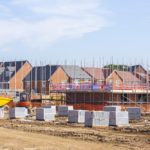New-build homes should be heated using low-carbon energy sources and have ultra-high levels of energy efficiency alongside appropriate ventilation, according to a new report by the Committee on Climate Change.
Image: Adobestock/Ceebeestock
The new report, ‘UK housing: Fit for the future?’, believes that the costs of building to tight specifications are not prohibitive, and getting the design right from the outset is far cheaper than retrofitting later.
The report warns that the UK’s legally-binding climate change targets will not be met without the near-complete elimination of greenhouse gas emissions from UK buildings. It finds that emissions reductions from the UK’s 29 million homes have stalled, while energy use in homes – which accounts for 14% of total UK emissions – increased between 2016 and 2017.
Baroness Brown, Chair of the CCC’s Adaptation Committee, said: “This report confirms what we have long-suspected: UK homes are largely unprepared for climate change. The Government now has an opportunity to act. There must be compliance with stated building designs and standards. We need housing with low-carbon sources of heating. And we must finally grasp the challenge of improving our poor levels of home energy efficiency.”
The proposals on new homes are one of five priorities it has named which includes retrofitting existing homes and addressing the skills gap.
John Alker, Director of Policy and Places at UKGBC said: “We welcome the CCC’s wide-ranging report which looks unflinchingly at the breadth and depth of the challenge we face in decarbonising UK homes. With the Government rightly intent on delivering more and more properties to address the housing crisis, these homes must be delivered to high environmental standards. We must start by not making the problem worse, which is why UKGBC is calling for an urgent step-change in the energy performance of our homes, and all new buildings to be net zero carbon by 2030.”
Tom Thackray, CBI Energy and Infrastructure Director, said: “The Committee on Climate Change’s report provides a stark warning about the need to act right now to improve energy efficiency in, and reduce carbon emissions from, the UK’s homes.
“There is a gaping policy gap that must be addressed to support the low-carbon measures that will save consumers money. No single government department has total ownership of this issue, so it will require greater collaboration and input from business to provide the correct regulations on heat and energy efficiency, skills and funding to ensure that the UK’s homes are fit for the future.”
Welcoming the announcement, Simon Lomax, CEO of the Kensa Group, a leading manufacturer and installer of ground source heat pumps, said: “We wholly embrace the CCC’s call for urgent action and would hope the Government would look to introduce this requirement before 2025. The report identified a skills gap, but the knowledge and technology is already here.”
However Ian McCluskey, Head of Technical Services and Policy from IGEM, the professional engineering institution for the global gas industry, said: “We do not agree with the recommendation that no new houses built after 2025 should be connected to the gas grid and we would urge the government not to rule out any options lest it impact on the long-term feasibility of a no regrets solution to the decarbonisation of heat.”
He continued: “Britain has one of the most advanced and efficient gas infrastructure networks in the world with 23.2 million customers connected to 284,000km of pipeline, including almost 85 per cent of homes. The distribution networks alone are worth over £17 billion and the industry contributes £2.37 billion gross value added (GVA) to the UK economy.
“The existence of the gas grid does not preclude other solutions for decarbonisation. Hydrogen can play a valuable role as part of the heating solution for UK buildings in combination with hybrid heat system solutions and more energy efficient homes. These latest recommendations make that future less likely and more difficult to achieve.”









